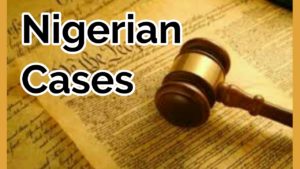In the recent Nigerian case of Benjamin v Kalio (2018) 15 NWLR (PT 164), decided on the 17th day, December, 2017, the Supreme Court of Nigeria held that following the provisions of section 4 (3) and (5) of the 1999 Constitution of the Federal Republic of Nigeria, section 20 of the Land Instrument (Preparation & Registration) Law, Cap. 75, Law of Cross Rivers State was void since the Evidence act, which is a federal legislation has already provided a law covering the same area as the state law. This case is probably the latest Nigerian cases on the admissibility of land instruments as evidence in court proceedings.

The facts, issues and decision of the court in Benjamin v Kalio will be given below.
Also read: Best law firms in Nigeria: Top 10
MR. MOSES BENJAMIN
MR. WILLIAMS JOSHUA
MR. OCHEMIEBIA KUROMIEMA
(Appellants)
V
MR. ADOKIYE KALIO
MR. JUSTICE KALIO
(Respondents)
SUPREME COURT OF NIGERIA
SC. 207/2006
JUSTICES:
- OLUKAYODE ARIWOOLA, J.S.C (Presided)
- JOHN INYANG OKORO, J.S.C
- AMIRU SANUSI, J.S.C
- EJEMBI EKO , J.S.C (Read the lead judgment)
- PAUL ADAMU GALINJE, J.S.C
- SIDI DAUDA Bage, J.S.C
FRIDAY, 15TH DECEMBER 2017
Facts of the case of Benjamin v Kalio
The case started at the High court of Cross River state where the appellants Instituted an action against the respondents, claiming a declaration that the parcel of land known as “Awoka land” situated at Abuloma Town, Port Harcourt, Rivers State belongs to them. Their contention was that the land in dispute is owned by Chief Otopo, founder of Otopo House of Abuloma town. They further stated that the Gobo family had since the days of Chief Otopo been in exclusive possession of the land verged green in their survey plan. Thus, they were entitled to the parcel of land.

When addressing the court, the respondents did not rebut the root of title to the land as earlier explained by the appellant. They only claimed that since the land was sold to them by the Appellant’s family in 1979, the title of the land should be vested in them and not to the appellant. At the High Court, the respondents tendered the deed of conveyance evidencing transaction and it was admitted by the trial court considering that it was properly pleaded and was therefore admissible in court.
It was also promulgated by the respondents that they (the plaintiffs and respondents) at some point, subjected themselves to customary arbitration by the Abuloma Council of Chiefs who decided in favor of the respondents. They contended that since the appellants have refuse to leave the land even after the arbitration process, it was a continuous trespass on the land by the appellants. Even the appellant’s witness, PW1, corroborated the fact that the decision was accepted by the Appellants.
Conversely, the respondents evidenced that they brought two portions of land from the Appellants’ family and after buying the second portion, a survey plan was prepared which incorporated the two portions of land. The secretary and Chairman of the family as at the date of his testimony in court, also confirmed the assertions made by the respondents.
On giving his judgment, the trial judge dismissed the appellants’ claim and granted the respondents’ counter-claim. The court also held that the Appellants was to pay N1,500,00.00 to the Respondents.
Aggrieved with the decision of the trial court, the appellants’ appealed to the Court of Appeal. At the Court of Appeal, the appeal was also dismissed. The court of appeal however, reduced the amount to be paid for trespass from N1,500,000.00 to 750,000.00. Aggrieved with this decision, the appellant quickly appealed to the Supreme of Nigeria.

Also read:
- Are lawyers liars? See the truth as to whether lawyers are really liars here.
- How to become a successful lawyer in your country
Issues determined in Benjamin v Kalio
- Where the respondent proved his case at the trial court to warrant the order of the court of appeal affirming the decision of the trial court
- Whether the Court of Appeal was justified for awarding N750,000.00 as general damage against the plaintiff’s.

MUST READ: Cheapest universities to study law in Nigeria
Decision of the Supreme Court in Benjamin v Kalio
Unanimously dismissing the appeal, the Supreme Court of Nigeria held that a registerable land instrument not registered in accordance with the law, like the Land Instrument (Preparation and Registration) Law, Cap. 75, Laws of Rivers State, 1999, is rendered inadmissible in evidence, and if erroneously admitted in evidence shall be liable to be expunged therefrom. Thus, a registrable instrument which is not registered cannot be pleaded.
That notwithstanding, the court further stated that a piece of evidence pleaded and admissible in evidence by dint of the Evidence Act cannot be rendered unpleadable and inadmissible in evidence by a law enacted by the House of Assembly of state under the prevailing constitutional dispensation.
In the instant case, the appellants’ contention that section 20 of the Land Instrument (Preparation and Registration) Law, Cap. 75, Laws of Rivers State, 1999 rendered exhibit “L”, a land instrument, unpleadable and inadmissible in the proceedings at the Trail Court went to naught. The admissibility of the exhibit “L” is governed by the Evidence Act, not the Land Instruments (Preparation and Registration) Law, Cap. 75 Laws of Rivers state, 1999.
Conversely, the trial court was right when it held that exhibit “L” was properly pleaded and could not be said to be inadmissible under any law enacted by the House of Assemble of Rivers state.
Delivering the lead Judgment, Eko JSC said that even if section 20 of the Rivers State Law, Cap 74 were applicable in the circumstances of this case, i will still rule in favor of the position adopted by the respondent: that an unregistered “registrable land” instrument is admissible in evidence to prove, not only the payment and receipt of the purchase price, but also the equitable interest of the purchaser in the subject land.
That has been the entrenched position in our jurisdiction until evidence was lifted into the exclusive legislative list in the second schedule to the Constitution as can be seen from the case of Savage v Sarrough (1937) 13 NLR 141; Ogunbambi v Abowab (1951) 13 WACA 22 and Fakoya v St. Paul’s Church, Shagamu (1966) 1 ALL NLR 74.

In totality, the court stated that the land instrument, “Exhibit L“, was properly pleaded and admitted in evidence. The trial court was right in acting on it as a piece of legal evidence before it. The lower court had no difficulty affirming the position of the trial court on this.
Also read:
By way of conclusion, i must point out that the case of Benjamin v Kalio does not actually go against the principle that a registerable land instrument not registered in accordance with the law is rendered inadmissible in evidence. In my firm view, the Supreme Courts judgement was based on the argument that an unregistered “registrable land” instrument is admissible in evidence to prove, not only the payment and receipt of the purchase price, but also the equitable interest of the purchaser in the subject land.
Well that is all I have to say on this case. If you have any question or contribution to make on this case, please share them with us using the comment section. I will be glad to here from you.

Edeh Samuel Chukwuemeka, ACMC, is a lawyer and a certified mediator/conciliator in Nigeria. He is also a developer with knowledge in various programming languages. Samuel is determined to leverage his skills in technology, SEO, and legal practice to revolutionize the legal profession worldwide by creating web and mobile applications that simplify legal research. Sam is also passionate about educating and providing valuable information to people.